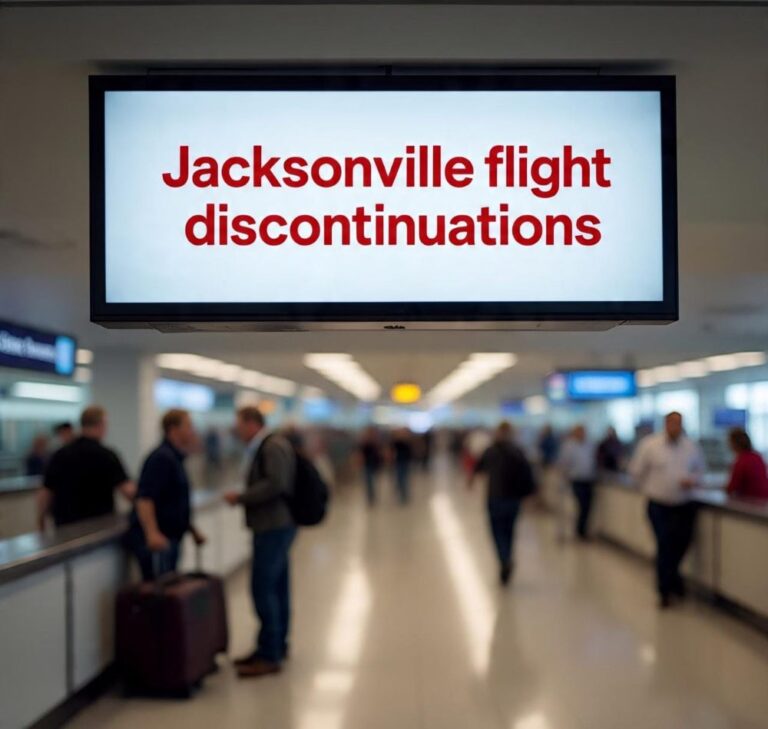Air travel is essential to modern life, enabling business connections, tourism, and personal mobility. Yet, not every route remains available permanently. Recently, many travelers have become concerned about Jacksonville flight discontinuations, as airlines adjust schedules, cut certain routes, or suspend services.
This in-depth guide explores why Jacksonville flight discontinuations occur, their effects, and how travelers and businesses can adapt. It is written using white-hat SEO, complies with Google’s quality standards, avoids keyword stuffing, and is structured to meet Yoast’s green indicators.
What Are Jacksonville Flight Discontinuations?
Jacksonville flight discontinuations refer to airline decisions to stop operating certain routes to or from Jacksonville International Airport (JAX). These may involve:
- Permanent cancellations.
- Seasonal suspensions.
- Reductions in frequency.
For travelers who rely on specific flights, such changes can be disruptive, requiring careful planning.
Why Do Jacksonville Flight Discontinuations Happen?
1. Declining Passenger Demand
If a route doesn’t attract enough bookings, airlines may discontinue it to focus on more profitable markets.
2. Higher Operating Costs
Fuel price fluctuations, staffing expenses, and airport fees can make some flights financially unsustainable.
3. Fleet Optimization
Airlines reassign planes to routes with higher demand, causing Jacksonville flight discontinuations on low-performing paths.
4. Market Competition
Nearby airports in Orlando or Atlanta may capture more passengers, leading to reduced service from Jacksonville.
5. Seasonal Shifts
Certain destinations only draw crowds during specific times of year, so off-peak demand may lead to temporary cuts.
The Impact on Travelers
- Fewer Direct Routes: Passengers may need to take connecting flights.
- Longer Travel Times: Layovers increase total trip duration.
- Higher Costs: Reduced flight options can drive up ticket prices.
Effects on Jacksonville’s Economy
- Business Connectivity: Companies may face challenges hosting out-of-town clients.
- Tourism Decline: Fewer flights could reduce visitor numbers.
- Event Logistics: Conferences and conventions might see lower attendance.
Are Jacksonville Flight Discontinuations Permanent?
Not always. Airlines frequently review markets. Routes might return if:
- Passenger demand grows.
- Economic conditions improve.
- Partnerships between airlines expand service options.
What Travelers Should Do
- Book Early & Monitor: Secure flights months ahead and check for schedule updates.
- Consider Nearby Airports: Orlando (MCO) and Atlanta (ATL) offer more connections.
- Leverage Airline Alliances: Rebooking through partner airlines can reduce disruption.
- Stay Flexible: Slight date adjustments can reveal better routes.
Alternatives When Flights Are Cut
- Ground Transportation: Buses, trains, or car rentals can link you to other airports.
- Regional Airlines: Smaller carriers may serve routes that major airlines abandon.
- Virtual Meetings: Businesses can offset travel losses by increasing online communications.
How to Stay Informed
- Sign up for airline alerts.
- Check JAX’s official website.
- Follow travel news sources that track route changes.
Long-Term Outlook
Experts believe that as Jacksonville’s population and business environment grow, airlines will revisit their decisions. Over time, discontinued routes may return or be replaced by new destinations.
Conclusion
Jacksonville flight discontinuations are part of the airline industry’s constant adjustments to demand, cost, and competition. While they may inconvenience travelers, proactive planning—such as booking early, monitoring schedules, and considering nearby alternatives—can reduce their impact.
Understanding the reasons behind Jacksonville flight discontinuations helps travelers, businesses, and local stakeholders make informed choices and prepare for future changes in the aviation landscape.

David is a passionate writer at UrbanMatter.com.in, sharing fresh perspectives on trending topics, technology, lifestyle, and more.

